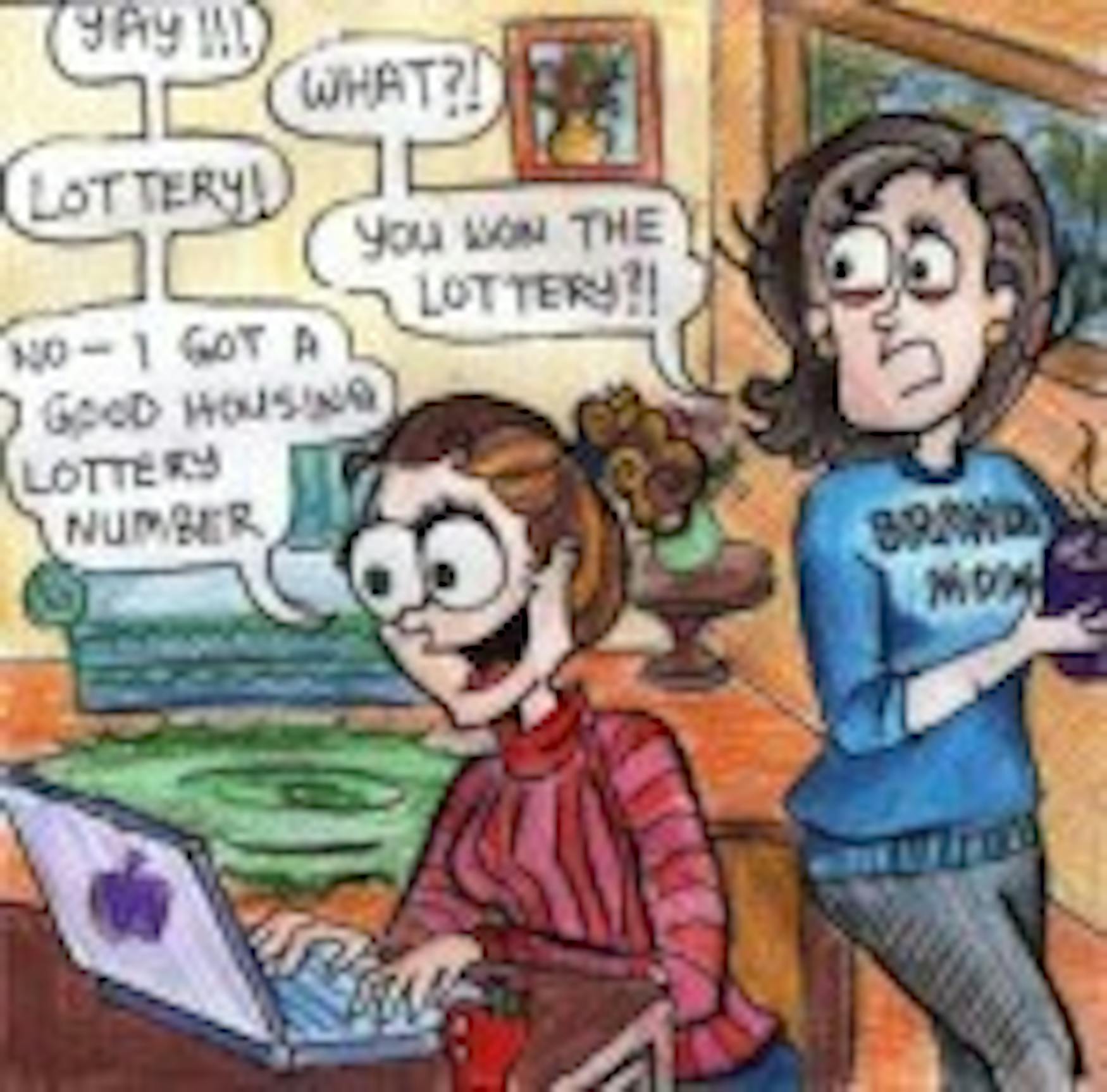Switch to Northeastern's housing system
While desperately perusing this year's online Unofficial Brandeis Housing Lottery Registry, I took comfort in my own number as I stumbled upon others' dismay. Here are a just a few excerpts of what I came across-2089: "Bahahahahahahaha. Useless. Pull me in, someone beautiful" 1997: "A good year, but not such a great housing number. Ideally I'd love something with a kitchen, but will gladly live anywhere with walls and a roof." 1705: "Would like to be pulled into a ziv or ridgewood if possible. I can clean, cook, and do tons of stuff. Contact me on Facebook or by email." Then there were those who posted their numbers with an air of doomed humor-1983: "On one of my ID cards it says I was born in this year," or 2200: "At least I got a round number," or 2396: "Wish I could switch this with my SAT score lol!"
You might say that the Brandeis housing lottery is the only Brandeis tradition that degrades students' dignity more than Pachanga. For students who want to hold onto the "college experience" of on-campus dorm living for the last year or two of their college career, the knowledge that the last suite in Ziv ran out around lottery number 1200 last year is quite a cause for panic. This means that only about 12 percent of students may be above the fray of begging their friends to pull them in.
While I write this in only the grimmest of jest, it is important to recognize that where one decides to live will have a large impact on one's happiness and lifestyle for the entirety of the coming school year.
While there are many students who may take pleasure in the kitchens, tranquility and separation from campus available to those who live in the Charles River Apartments, many prefer to thrive on the possibilities presented by living in a noisy, energetic and convenient location directly on the main campus. Terrified of ending up separated from friends in a dorm that is not conducive to students' lifestyles, year after year, the imminent doom of rooming selection inspires a cascade of alliances and agreements. These are followed by pity, broken promises, severed friendships, hurt feelings and drama, all taking place for the unnecessarily drawn-out timespan of a month.
The amount of frustration, anger and stress that accumulates over the course of this process makes it evident that this system is clearly flawed, and as such, an effort should be made to improve it.
There is no doubt that all of this drama is brought on by the shortage of on-campus housing. However, forcing an already small student population to negotiate with each other to fill the limited housing resources does nothing but exacerbate the stress of the situation. It would be wise of Brandeis to consider devising a new approach to the situation.
Perhaps the University could institute a solution similar to the one utilized at Northeastern University. The Department of Community Living could request that students complete a form listing a group of friends who would like to live together and rank the available housing choices based on their preferences.
While this system would certainly still leave room for the drama involved in selecting groups, the month of foreboding uncertainty as well as the burden placed on students who receive better lottery numbers to pull in the multitude of friends and acquaintances who grovel for mercy by way of a pull-in would be eliminated.
Though this alteration does not solve the problem of the lack of on-campus housing, it does alleviate the month of stress and deceit inherent in the current system. Students who still do not receive housing can be notified earlier than the end-of-March room selection dates and begin their independent searches for off-campus housing earlier.
Though it is impossible to expect the housing lottery system to be adjusted for this year, there are ways that the DCL could inform those in possession of lower numbers how many rising juniors or seniors have lottery numbers beneath theirs, in order to aid the planning of arranging living spaces available exclusively to rising seniors.
If mostly juniors were issued the numbers between 1001 and 1100, seniors with high numbers can expect to select a Foster Mod. Additionally, the DCL should publish historical statistics of the number at which each type of housing ran out.
For example, should a rising senior with number 1169 plan on getting a Mod? If so, do four-person Mods or six-person Mods historically fill up quicker?
By the way, I'm definitely not above the fray: If anyone wants to pull me into Ridgewood Quad, let me know. I can provide a full set of silverware, pots and pans and perhaps maid service? I'll pay you ... ?



Please note All comments are eligible for publication in The Justice.